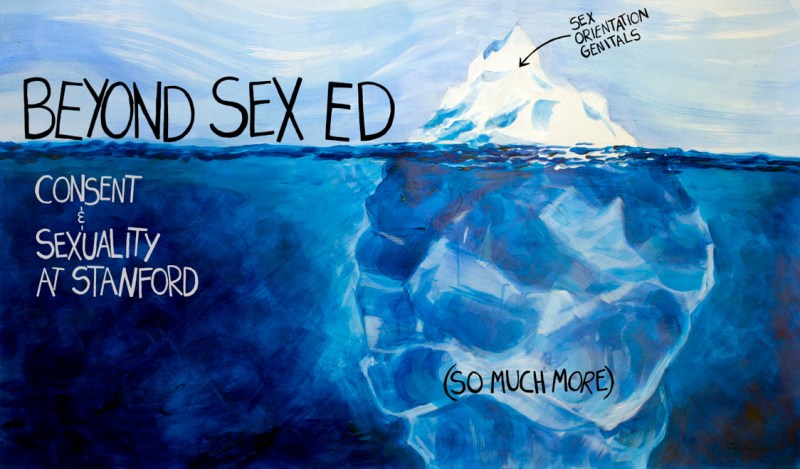The Class of 2020 was invited to attend Beyond Sex Ed: Consent and Sexuality at Stanford, a new event that aims to redirect the conversation around sexuality. This evening event took place Monday through Wednesday and featured 12 student speakers.
“The whole program is based on how we look at sexuality as an integral part of our humanity, both culturally and experientially,” said Brianna Booth, Director of Positive Sexuality, Design and Development in Stanford’s Office of Sexual Assault and Relationship Abuse Education and Response (SARA).
“We’re creating space for a gracefully radical conversation,” she added. “We do that from the inside out, sharing stories from within our community to bring sexuality out from the shadows of shame, fear and ignorance and breathing warmth into it. This community of incoming students has enormous potential; we’re seeking to create a space for an engaging conversation, providing tools and a framework for navigating the terrain of sexuality together.”
“We invite students to think about what they learned about sex, from family, peers, religion or sex ed,” said Booth. “We look at what cultural messages we got and what guidance we did or didn’t get. Then, we introduce a framework for considering multiple aspects of sexuality, including intimacy, sensuality, identity, sexual health and reproduction, emphasizing the role of agency and the influence of culture and how all of this shapes the meaning we attribute to our experiences of sexuality.”
“[The program] places agency and consent as the central part of [the discussion of sexuality], “said Erika Lynn Abigail Persephone Joanna Kreeger ’16, a speaker at this year’s Beyond Sex Ed.
“I think what’s really cool is that as we’re having these discussion about sexual violence on campus,” Kreeger said, “what this program does is recenter and reframe the role that agency plays in our lives, beyond even sexuality.”
The 12 students each share their own personal stories surrounding themes of sexuality. Students were selected under numerous criteria and were required to fill out an application.
“The 12 speakers are the heart and soul of this,” Booth said. “Their personal stories bring the broader dimensions of sexuality to life. The stories let us feel. They teach us how to listen for what’s real and true for the storyteller, and at the same time, they give us the opportunity to listen for what’s real and true for us. It’s a whole different way to engage this topic that most people haven’t had the opportunity to do.”
“We made a very conscious effort to have a very diverse group. Each of the speakers is in some way speaking to something, there is a kind of common thread that runs through each of the speakers,” Kreeger said.
“It’s a really big community, the 12 of us get along really well and I think that comes across very evidently in the show. We have stories that go as lighthearted as someone very comedically recanting how they realized they do not like sex, to a women talking about being raped and the difficulty around that. Despite this whole range of stories, everyone is supporting each other. We’re always there for each other,” Kreeger said.
“It was so raw and real that anyone could appreciate it. Anytime you have speakers with personal experiences they’re touching on, it always makes it more effective,” said Amit Kohli ’20, an audience member.
Kreeger first initiated the idea behind the program back in January and they attributes their motivation for the project to their own personal experiences.
“Until we have some conversation that bring warmth, humanity and community into this, far too many people are going to be struggling. I think about what a young Erika Lynn would have thought sitting in those rows, and it would have changed a lot for me,” Kreeger said.
The event is aimed at freshmen, with participation required and make-up sessions held for those who cannot make it.
“The frosh are just coming into Stanford, so I think it’s important the program be tailored to people that are just starting to experience life in college,” Kreeger said. “Of people who are sophomores, juniors and seniors, we’ve already experienced a lot and already built up a lot of preconceived notions based on our experiences. As frosh, they have not had those opportunities yet.”
“It’s really focuses on their potential as a community,” Booth added.
“They’re the first class at Stanford to have this conversation, Beyond Sex Ed. I ask them how this might change the way they’re here at Stanford, how they care for one another, and then beyond this campus,” said Booth.
Correction: A previous version of this article used the incorrect gender pronouns for Erika Lynn Abigail Persephone Joanna Kreeger, who uses they/them pronouns. This is a mistake that The Daily takes seriously and will improve on in the future. Additionally, the previous version referenced Kreeger as “Lynn,” mistakenly reporting part of their first name as their last name. The Daily regrets these errors.
Contact Arielle Rodriguez at arielle3 ‘at’ stanford.edu.
